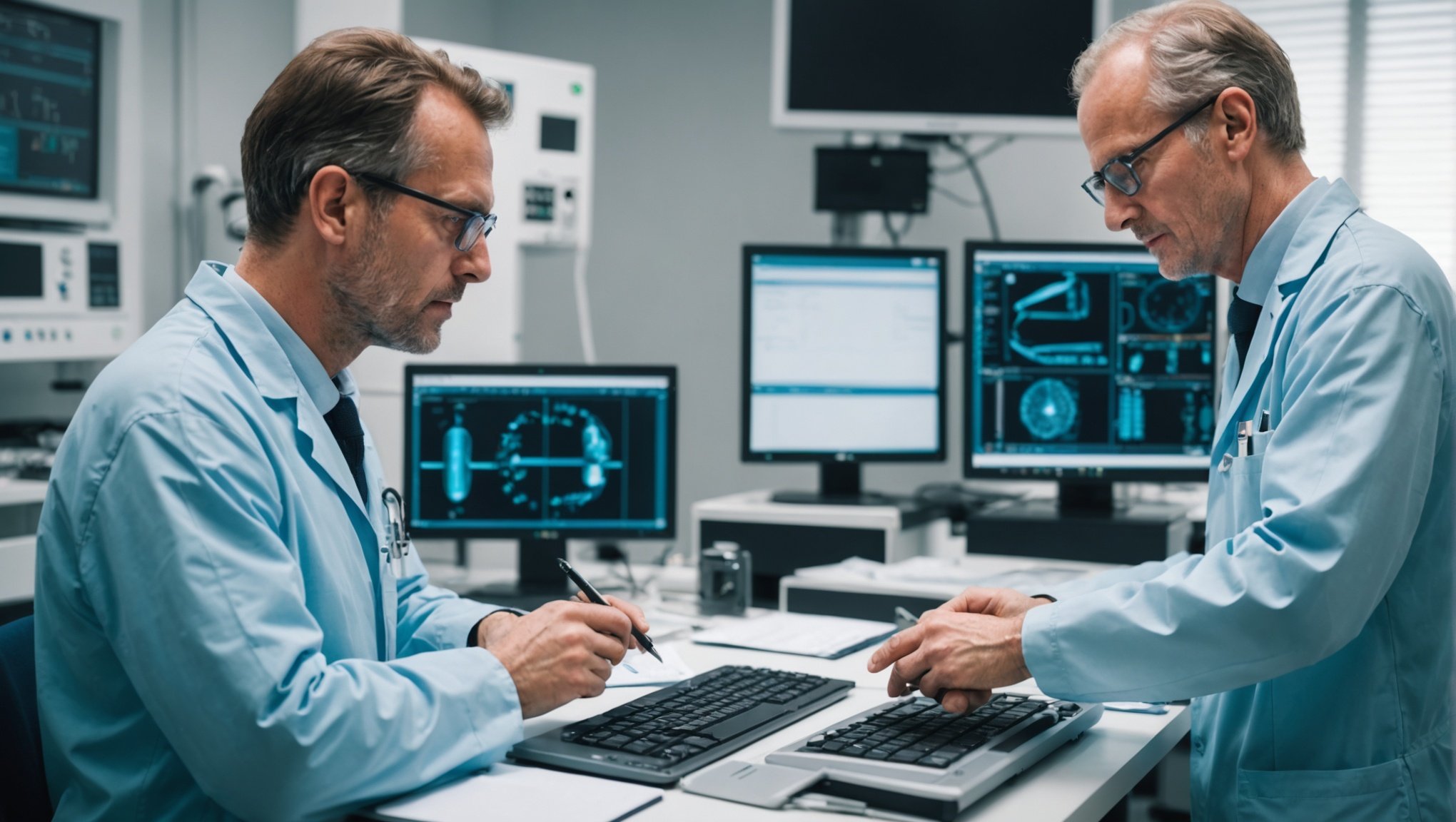The integration of AI in predictive maintenance is transforming UK hospitals. This technology not only enhances operational efficiency but also extends the lifespan of medical equipment. By anticipating failures before they occur, hospitals can ensure better patient care, reduce costs, and minimize downtime. The benefits are substantial, impacting everything from budget allocations to patient outcomes. This shift toward intelligent maintenance practices offers a glimpse into a future where healthcare systems operate with unparalleled reliability.
Overview of Predictive Maintenance in Healthcare
Predictive maintenance is revolutionising healthcare technology by ensuring medical equipment operates efficiently and reliably. This approach involves using data analytics to predict when equipment might fail, allowing hospitals to perform maintenance proactively. The goal is to minimise downtime and extend the lifespan of critical medical devices.
Also read : Top AI Solutions to Elevate Customer Service in the UK: Unlocking the Future of Support Tools
Definition and Importance
Predictive maintenance in hospitals focuses on medical equipment management. It involves collecting data from equipment sensors and analysing it to forecast potential failures. This proactive strategy reduces unexpected breakdowns, ensuring that essential machinery like MRI machines and ventilators remain operational. By preventing equipment failures, hospitals can provide uninterrupted patient care, enhancing overall healthcare delivery.
Key Components
A robust predictive maintenance system comprises several key components:
In parallel : Revolutionizing Customer Loyalty: The Role of AI in UK Retailers” Programs
- Data Collection: Sensors gather real-time data on equipment performance.
- Data Analysis: Advanced algorithms process this data to identify patterns and anomalies.
- Maintenance Scheduling: Predictive insights inform maintenance teams about when to service equipment.
Current Trends
The integration of IoT (Internet of Things) in healthcare technology is a significant trend, enabling more precise predictive maintenance. Additionally, artificial intelligence enhances data analysis, making predictions more accurate. As technology advances, predictive maintenance systems are becoming more sophisticated, offering greater reliability and efficiency in medical equipment management.
The Role of AI in Enhancing Equipment Longevity
Artificial Intelligence (AI) is playing a transformative role in extending equipment longevity in healthcare settings. By employing sophisticated AI algorithms, hospitals can significantly improve the accuracy of predictive maintenance. These algorithms analyse vast amounts of data collected from medical equipment, identifying subtle patterns that might indicate potential failures before they occur.
Real-time monitoring is another critical advantage of AI in this context. AI solutions enable continuous data collection and analysis, providing healthcare professionals with up-to-date information on equipment status. This capability ensures that any anomalies are detected promptly, allowing for immediate intervention and reducing the risk of unexpected breakdowns.
Integration of AI with existing hospital management systems further enhances the effectiveness of predictive maintenance. By seamlessly embedding AI solutions into current workflows, healthcare facilities can streamline operations and ensure that maintenance schedules are optimally aligned with equipment needs. This integration not only boosts efficiency but also helps in maintaining the high standards required for patient care.
In summary, the incorporation of AI in predictive maintenance strategies is crucial for prolonging the life of medical devices, ensuring they remain functional and reliable. As AI technology continues to advance, its role in healthcare will undoubtedly expand, offering even more robust solutions for equipment management.
Case Studies from UK Hospitals
Within the UK, several hospitals have successfully implemented AI-driven predictive maintenance strategies, showcasing the transformative potential of this technology.
Successful Implementation Examples
UK hospitals such as the Royal Free London and Guy's and St Thomas' have embraced AI to enhance equipment management. By integrating AI algorithms with existing hospital systems, these institutions have improved their predictive maintenance capabilities, reducing equipment downtime and ensuring continuous patient care. For instance, Guy's and St Thomas' Hospital implemented an AI solution that analyses data from MRI machines, significantly decreasing unplanned maintenance incidents.
Measurable Outcomes and Benefits
The measurable outcomes from these case studies are noteworthy. Royal Free London reported a 30% reduction in equipment failures, illustrating the tangible benefits of AI implementation. Additionally, hospitals experienced improved patient throughput and satisfaction, as medical devices remained operational without unexpected interruptions. The financial savings from reduced maintenance costs also highlight the economic advantages of adopting AI-driven strategies.
Lessons Learned from Case Studies
From these case studies, UK hospitals have learned the importance of seamless integration of AI into existing workflows. Effective communication between IT and clinical teams was crucial to ensure smooth implementation. Moreover, continuous training and adaptation were necessary to fully harness the potential of AI, ensuring that all staff were equipped to leverage these advanced technologies effectively.
Benefits and Challenges of AI Adoption in Predictive Maintenance
Adopting AI technologies in predictive maintenance offers numerous benefits to healthcare facilities. One of the primary advantages is the enhanced accuracy in predicting equipment failures, which leads to reduced downtime and maintenance costs. AI's ability to process vast amounts of data allows hospitals to identify potential issues before they become critical, ensuring continuous patient care.
However, the adoption of AI technologies is not without its challenges. One significant hurdle is the integration of AI systems with existing hospital infrastructure. Many facilities struggle with outdated systems that are not readily compatible with advanced AI solutions. Additionally, there is often resistance from staff who may be hesitant to trust automated processes over traditional methods.
To overcome these barriers, hospitals can implement several strategies. Firstly, investing in training programs for staff can help demystify AI technologies and build confidence in their capabilities. Secondly, ensuring robust communication between IT and clinical teams can facilitate smoother integration of AI systems. Finally, incremental implementation allows hospitals to gradually adapt to new technologies, minimising disruptions to daily operations.
By addressing these challenges, healthcare facilities can fully harness the benefits of AI technologies, leading to more efficient predictive maintenance and improved patient outcomes.
Future Trends and Best Practices in Healthcare Technology Management
In the realm of healthcare management, emerging technologies are set to redefine predictive maintenance. As hospitals increasingly adopt cutting-edge solutions, future trends indicate a shift towards more integrated systems. These systems will leverage AI and IoT to offer real-time insights, enhancing decision-making processes. This integration not only improves predictive accuracy but also minimises downtime, ensuring continuous patient care.
Implementing AI in hospital settings demands adherence to best practices. A critical aspect is the seamless integration of AI solutions with existing systems. This involves ensuring compatibility and fostering collaboration between IT and clinical teams. Moreover, hospitals should prioritise data security, safeguarding patient information while harnessing AI's potential.
Continuous training and development are essential in technology management. As technology evolves, so must the skills of healthcare professionals. Regular workshops and training sessions can equip staff with the necessary expertise to operate advanced systems effectively. This ongoing education ensures that all personnel remain updated on the latest technological advancements, facilitating smoother transitions and optimised operations.
In conclusion, embracing future trends and adhering to best practices will empower healthcare facilities to maximise the benefits of predictive maintenance, ultimately enhancing patient outcomes and operational efficiency.










